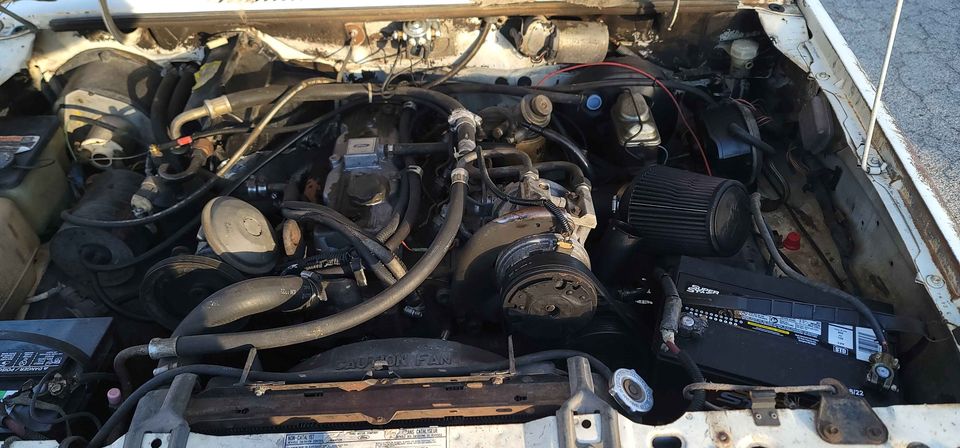Why the 2.2 Ford Ranger Engine Is a Popular Choice for Rugged and Reliable Performance
Why the 2.2 Ford Ranger Engine Is a Popular Choice for Rugged and Reliable Performance
Blog Article
What Makes a Cars And Truck Engine Run Smoothly: Leading Tips for Ideal Treatment
The smooth operation of an auto engine is fundamental to both efficiency and durability, making optimum treatment an essential responsibility for lorry proprietors. What specific actions should you prioritize to guarantee your engine continues to be in peak problem?
Regular Oil Modifications
Among one of the most crucial facets of vehicle upkeep is guaranteeing your engine obtains regular oil changes. Engine oil lubricates interior elements, decreases rubbing, and assists maintain optimum operating temperatures. With time, oil breaks down because of heat, contaminants, and the natural results of combustion, bring about decreased efficiency and prospective engine damage.
The majority of producers suggest transforming the oil every 5,000 to 7,500 miles, however this period can vary based on driving conditions and oil kind. For circumstances, artificial oils might permit for longer periods between changes. Regular oil adjustments not just boost engine efficiency however likewise improve fuel efficiency, as tidy oil promotes smoother operation.
Neglecting oil adjustments can cause sludge accumulation, which impairs blood circulation and can cause serious engine problems. It is crucial to check oil degrees frequently and monitor for any uncommon adjustments in color or consistency, which might indicate contamination or destruction.

Keeping Coolant Degrees
Preserving appropriate coolant degrees is necessary for avoiding engine getting too hot and ensuring ideal performance. The coolant, typically a mixture of water and antifreeze, circulates via the engine, absorbing warm and protecting against thermal stress. Insufficient coolant can result in boosted engine temperature levels, which may cause severe damages or even overall engine failing.
To maintain optimum coolant degrees, routinely check the coolant storage tank, typically situated in the engine bay. Make sure the coolant is loaded to the suggested mark, as shown in your vehicle's owner manual. It is recommended to examine the degrees at least once a month or soon journeys, particularly throughout extreme weather.
If you observe that the coolant level is continually reduced, there might be a leak in the air conditioning system, which ought to be addressed immediately to avoid more difficulties. 2.2 ford ranger engine. In addition, flushing the coolant system every 2 to three years can aid get rid of any built up debris and guarantee efficient warmth exchange
Monitoring Air Filters

It is suggested to check the air filter every 12,000 to 15,000 miles, or a lot more frequently if driving in unfavorable or dirty problems. An easy aesthetic examination can commonly expose whether the filter is filthy or harmed. If the filter appears tarnished or has noticeable dirt buildup, it ought to be changed promptly.
Using a top quality air filter developed for your details vehicle design can better boost engine efficiency. Furthermore, some vehicles might gain from recyclable filters that can be cleaned up and re-installed, supplying a affordable and eco-friendly alternative.
Inspecting Flicker Plugs
Spark plugs are necessary elements of an automobile's ignition system, straight influencing engine efficiency and performance. They create the trigger that fires up the air-fuel combination in the burning chamber, assisting in the engine's power generation. Normal assessment of spark plugs is critical for keeping optimal engine feature and stopping possible problems.
Dark residue or oil down payments can show improper burning, while a white or blistered appearance might suggest overheating. Both conditions call for instant attention to protect against more engine damage.
It's a good idea to examine ignition system every 30,000 miles, or as suggested in your vehicle's owner manual. In addition, think about replacing them according to the manufacturer's standards, as worn or old ignition system can bring about misfires, lowered gas performance, and increased discharges.
Monitoring Tire Pressure
Making sure appropriate tire stress is a critical facet of car safety and performance. Under-inflated tires can bring about lowered gas efficiency, enhanced tire wear, and compromised handling. Conversely, over-inflated tires can lower grip and enhance the risk of blowouts. Consequently, normal tracking of tire stress is vital for optimal vehicle operation.
Tire stress should be checked at the very least index once a month and soon trips. Utilize a reputable tire pressure gauge to measure the stress when the tires are chilly, preferably before the lorry has actually been driven for at the very least 3 hours. Describe the automobile's owner handbook or the placard located on the driver's side door jamb for the manufacturer's suggested stress levels.
It is necessary to keep in mind that tire stress can fluctuate with modifications in temperature level; a decline of 10 ° F can cause a 1-2 psi decline in pressure. In addition, aesthetically check tires for any type of signs of wear or damages throughout your surveillance regimen. Maintaining proper tire stress not only improves automobile safety and security but additionally improves fuel performance and prolongs tire life, inevitably adding to a smoother engine efficiency.
Conclusion
In verdict, maintaining an automobile engine's smooth procedure requires attentive attention to numerous key variables. Normal oil modifications, next page appropriate coolant degrees, tidy air filters, well-kept ignition system, and ideal tire stress collectively add to improved performance and durability. Adhering to these maintenance methods not just enhances gas performance yet additionally advertises a more secure driving experience. Ultimately, a positive approach to engine care is vital for making sure dependability and performance in time. 2.2 ford ranger engine.
One of the most crucial facets of vehicle upkeep is ensuring your engine receives routine oil adjustments. Engine oil lubes inner parts, lowers friction, and aids maintain optimal operating temperature levels. Normal oil adjustments not just improve engine efficiency yet her latest blog additionally improve fuel performance, as tidy oil advertises smoother procedure.
Insufficient coolant can lead to enhanced engine temperatures, which may create extreme damages or even complete engine failing.

Report this page